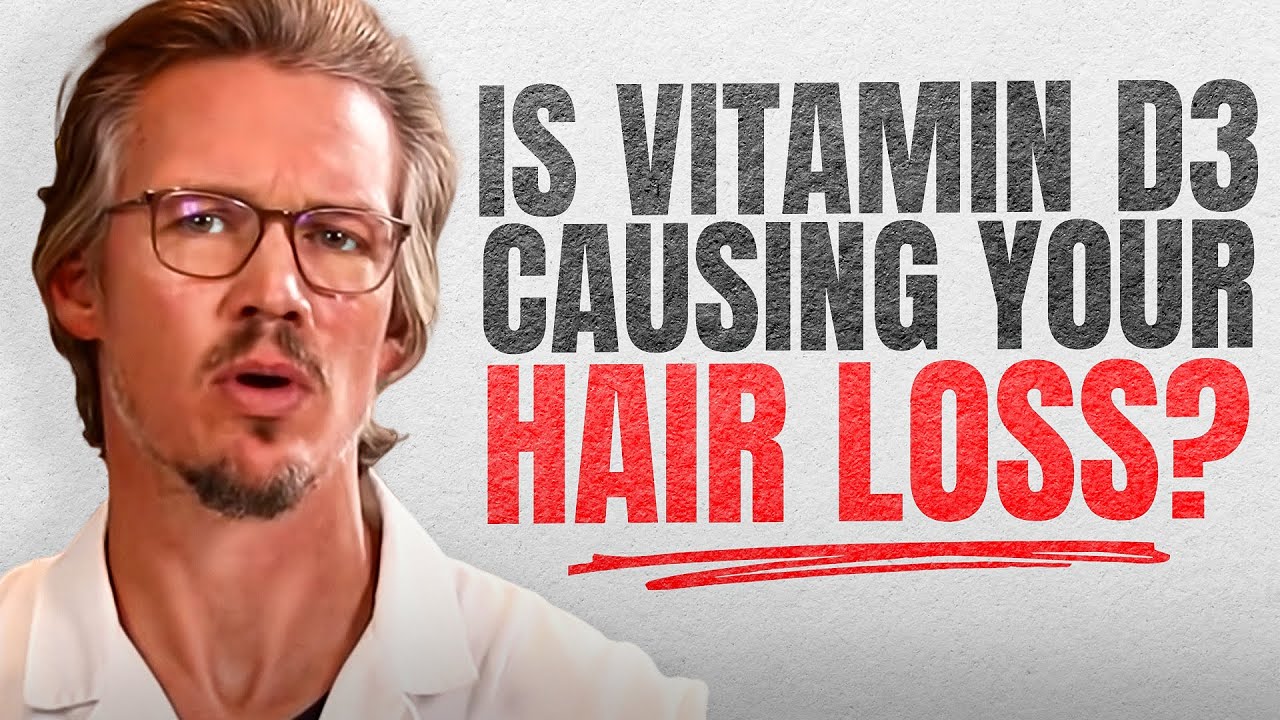The #1 Blood Test Most Overlooked for Hair Loss
Summary
TLDRThis video discusses the importance of vitamin D in preventing hair loss and promoting healthy hair growth. The speaker explains how the hair follicle functions, highlighting the role of vitamin D in regulating genes and stem cells vital for hair growth. Vitamin D deficiencies, often overlooked, can lead to hair thinning, scalp issues like psoriasis, and even autoimmune conditions like alopecia. Magnesium is also crucial, as it helps vitamin D work effectively by preventing scalp calcification. Regular vitamin D intake, along with magnesium and other nutrients, is recommended for optimal hair health.
Takeaways
- 🧬 Hair follicles are living cavities that support hair, but the hair itself is not alive.
- ⏳ Hair grows in three phases: growth (2-7 years), transition, and rest, where the hair is replaced by new growth.
- 🧪 DHT (dihydrotestosterone) and scalp calcification can interfere with hair growth by affecting the follicle and blood supply.
- 🌞 Vitamin D3 plays a critical role in hair health, affecting genes responsible for hair growth regulation, such as the beta Kine and Sonic Hedgehog genes.
- 🧬 High concentrations of vitamin D receptors are located in the hair follicle, crucial for healthy hair growth.
- 💊 Autoimmune diseases like alopecia are often related to vitamin D deficiencies, and vitamin D helps regulate immune responses.
- 🦠 Scalp conditions like psoriasis, dandruff, and dermatitis are linked to vitamin D deficiency, as it acts as a potent anti-inflammatory agent.
- 💪 Magnesium is vital for calcium regulation, preventing calcification of the scalp, and is crucial for hair health through its involvement in enzyme function and energy production.
- 🔬 Regular vitamin D blood tests may not fully reflect vitamin D's impact on hair, as different systems in the body utilize it differently, with skin and hair requiring higher levels.
- 📊 Optimal vitamin D levels should be 70-100 ng/mL, and daily supplementation of vitamin D (around 20,000 IU) with magnesium and co-factors like K2 and zinc is recommended for hair health.
Q & A
What is a hair follicle and how is it different from hair?
-The hair follicle is the cavity that supports the hair, while the hair itself is not alive. The follicle is alive and responsible for hair growth, whereas hair is simply a non-living structure.
What role does DHT play in hair loss?
-DHT (dihydrotestosterone) is a powerful form of testosterone that can damage hair follicles, interfere with hair growth regulation, and cause the hair to shrink, leading to hair loss.
What is scalp calcification and how does it affect hair growth?
-Scalp calcification occurs when calcium builds up around hair follicles, cutting off blood supply and nutrients to the hair. This can cause hair loss or thinning.
Why is vitamin D important for hair growth?
-Vitamin D is crucial for triggering certain genes, like the beta-catenin gene, which regulates the hair growth cycle. Without enough vitamin D, the hair growth process is disrupted.
What is the Sonic Hedgehog gene and how is it related to hair growth?
-The Sonic Hedgehog gene is one of the genes affected by vitamin D and plays a role in hair growth. It's involved in regulating hair follicle development and growth phases.
How is alopecia related to vitamin D deficiency?
-Alopecia, an autoimmune disease, is linked to vitamin D deficiency. Vitamin D helps regulate the immune system and reduces inflammation, which can help prevent autoimmune attacks on hair follicles.
What role does magnesium play in preventing hair loss?
-Magnesium helps regulate calcium buildup, which can cause scalp calcification and affect hair growth. It's also a co-factor for enzymes that assist vitamin D in its functions.
Why is magnesium difficult to test in the blood?
-Only 1% of the body's magnesium is present in the blood, with most of it stored inside cells. This makes blood tests for magnesium unreliable in determining magnesium levels in the body.
Why is it important to maintain high levels of vitamin D for hair growth?
-Vitamin D influences many functions beyond calcium regulation, including skin and hair health. For optimal hair growth, vitamin D levels in the blood should be at least 70 nanograms per milliliter.
What are some other important nutrients for hair growth?
-Zinc, iron, B12, and omega-3 fatty acids are also crucial for hair health. Zinc supports hair growth and repair, iron and B12 help supply oxygen to the hair follicles, and omega-3s prevent dryness.
Outlines

此内容仅限付费用户访问。 请升级后访问。
立即升级Mindmap

此内容仅限付费用户访问。 请升级后访问。
立即升级Keywords

此内容仅限付费用户访问。 请升级后访问。
立即升级Highlights

此内容仅限付费用户访问。 请升级后访问。
立即升级Transcripts

此内容仅限付费用户访问。 请升级后访问。
立即升级浏览更多相关视频

Thinning Hair? 4 Hormone Deficiencies

Does Vitamin D3 Deficiency Cause Hair Loss?

NOS MAS CANAS COME ESTO Y EVITALAS - Oswaldo Restrepo RSC

Onion Juice for Extreme Hair Growth: Stop Hair Loss

SAÇLARINI KURTARMAK İÇİN ÇOK GEÇ OLMADAN BU 3 ŞEYİ YAP

"SHOCKING HAIR LOSS SECRETS That Big Pharma Doesn't Want You to Know'' | Dr. Barbara O'Neill
5.0 / 5 (0 votes)
